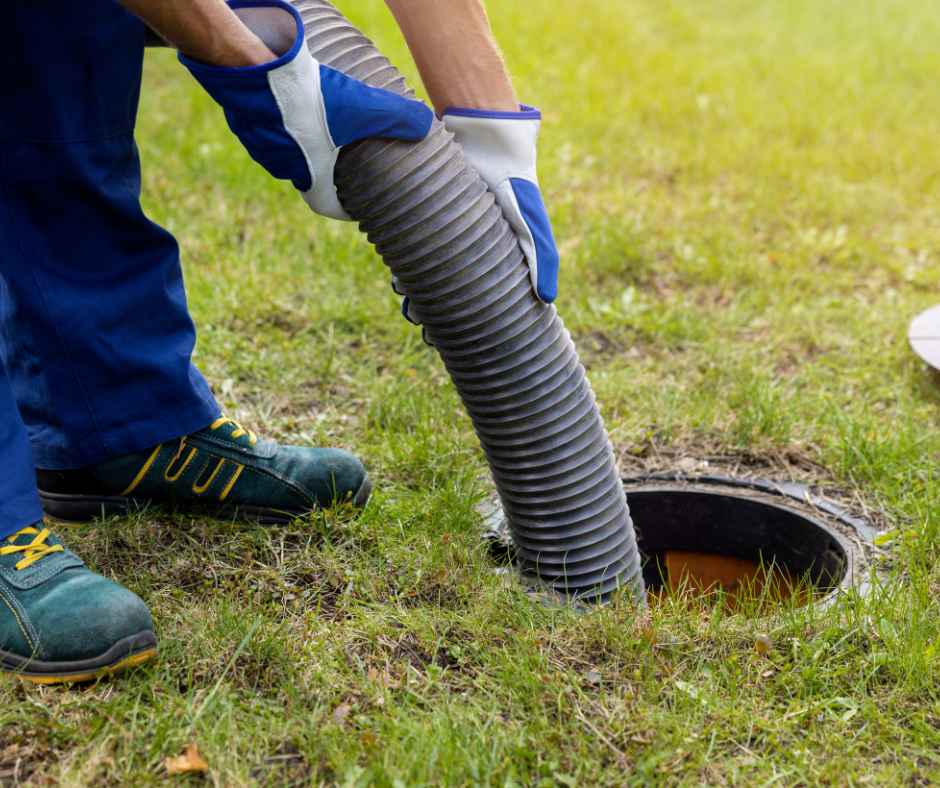Service 7 Days a Week

Proudly Serving Central Maryland
How Often Should You Have Your Septic Tank Pumped?

Save Time, Call Prime!
Most homeowners don’t think much about their septic system—until something starts to smell bad or a backup ruins their day. Out of sight and out of mind, the septic tank quietly handles every flush, shower, and load of laundry. But just because it’s underground doesn’t mean it should be ignored. If you wait too long to have your tank pumped, you could face expensive repairs, health hazards, and a yard full of mess.
Fortunately, a little preventive care can go a long way toward keeping your system in good shape. In this blog, we’ll cover how often you should schedule a pump-out, the signs it might be overdue, and how to keep your septic system working smoothly year-round.
Why Regular Septic Tank Pumping Matters
Your septic system is one of the most important—and most overlooked—parts of your home. It manages all the wastewater from your toilets, sinks, showers, and laundry. The tank itself is designed to separate solids from liquids, slowly breaking down waste with the help of natural bacteria. But over time, the solid layer builds up and has nowhere to go.
Without regular pumping, that solid waste can overflow, clog your drain field, or even send sewage back into your home. What starts as a minor inconvenience can quickly turn into a major plumbing disaster, complete with costly repairs, environmental hazards, and unpleasant cleanup. Pumping your septic tank on schedule helps prevent all of that. It keeps the system running efficiently, protects your property value, and ensures your plumbing stays safe, sanitary, and compliant with local health codes.
Key Signs You Need Your Septic Tank Pumped
Your septic system will usually give you a few warnings before a serious issue develops—but only if you know what to look for. Recognizing the early signs can help you take action before a backup or breakdown occurs.
Common Signs
If you notice any of the following around your home, it might be time to call in a professional:
- Slow drains: Sinks, showers, or tubs take longer than usual to empty.
- Bad odors: You catch whiffs of sewage in your yard or near your drains.
- Pooling water: Wet spots or standing water near your drain field.
- Gurgling sounds: Odd noises when flushing toilets or running water.
- Backups: Water or waste starts coming back up through toilets or drains.
- Extra-green grass: A patch of vibrant grass above your septic tank could mean it’s leaking.
Causes/Why It Happens
These problems usually stem from an overloaded or neglected tank. When solid waste builds up faster than it’s broken down or removed, it can block the outlet pipe or overflow into the drain field. Excessive water use, such as doing multiple loads of laundry in a day, can also overwhelm the system. Additives or household cleaners that kill off the helpful bacteria inside the tank make things worse by halting natural breakdown. When the balance inside the tank is off, it’s only a matter of time before problems rise to the surface—literally.
How Often Should You Pump Your Septic Tank?
While there’s no one-size-fits-all answer, most homeowners should plan to have their septic tank pumped every three to five years. That range can shift depending on your household’s water usage, tank size, and habits. Skipping or stretching out your pumping schedule may seem harmless—until you’re faced with clogs, overflows, or expensive repairs.
General Guidelines
For an average-sized household with a typical tank, the three-to-five-year range is a safe rule of thumb. However, larger families may need to pump every one to three years simply because more people create more waste. On the flip side, smaller households or homes with minimal plumbing usage—like vacation properties—might be able to go longer between services. The best approach? Schedule routine inspections to monitor sludge levels and make pumping decisions based on real data, not guesswork.
Factors That Affect Pumping Frequency
Several elements influence how quickly your tank fills and how often you’ll need service:
- Tank size: Smaller tanks reach capacity more quickly.
- Number of people in the home: More people equals more waste and water use.
- Water habits: Long showers, frequent laundry loads, and overuse of water-intensive appliances all add up.
- Garbage disposal usage: These add solids to the system, accelerating buildup.
- Cleaning chemicals: Some products harm the bacteria that break down waste, slowing the system’s efficiency.
Keeping these variables in mind can help you tailor a pumping schedule that keeps your system working its best.
What You Can Do Between Pumpings
Even if your septic tank doesn’t need pumping every year, that doesn’t mean you can ignore it. Proper care between pumpings can significantly extend the life of your septic system and reduce the risk of costly emergencies. It’s all about being smart with what you flush, pour, and drain.
DIY Maintenance Tips
You don’t need to overhaul your entire routine—just a few mindful adjustments can make a big difference:
- Spread out laundry loads: Doing too many loads in one day can flood the tank with water and stir up solids.
- Be mindful of what you flush: Stick to septic-safe toilet paper and never flush wipes, hygiene products, or paper towels.
- Avoid grease and oils: Pouring fats down the kitchen sink can clog your pipes and tank.
- Use septic-friendly cleaning products: Harsh chemicals can kill off the helpful bacteria that keep your system working.
- Conserve water: Install water-saving toilets, faucets, and showerheads to reduce the volume flowing into the tank.
When to Call a Professional
Not every issue can be handled with a DIY fix. Sometimes, calling a licensed septic professional is the smartest and safest option—especially when:
- You notice recurring slow drains or backups.
- It’s been more than three years since your last inspection.
- You’ve just moved into a home and aren’t sure when the tank was last serviced.
- You want peace of mind that your system is operating properly and not nearing failure.
Routine pumping is just one piece of the puzzle. A qualified technician can assess the tank’s condition, check for potential issues, and help you set a schedule that fits your home and lifestyle.
Additional Tips to Extend Septic System Life
Your septic system isn’t something you want to replace if you don’t have to—thankfully, with consistent care, it can serve your home reliably for decades. Beyond regular pumping and mindful flushing, a few extra habits can help you avoid the kind of damage that shortens a system’s lifespan.
Here are some smart ways to protect your investment:
- Keep a maintenance record: Document when your tank was pumped and inspected so you stay on schedule and can share the info if you sell your home.
- Protect your drain field: Never drive, park, or build over the area where your system filters wastewater—it needs breathable soil to work properly.
- Watch for surface water runoff: Divert gutters and downspouts away from your septic area to prevent oversaturation.
- Don’t plant trees nearby: Roots from large trees and shrubs can grow into the tank or pipes, causing blockages or structural damage.
- Educate your household: Make sure everyone knows the basics of what not to flush or pour down the drain.
These small habits go a long way in keeping your system healthy and reducing the chances of expensive surprises later.
Wrap-Up: Don’t Let a Full Tank Catch You Off Guard
Your septic system quietly handles some of the messiest jobs in your home, but it needs routine care to keep working properly. Staying on top of your pumping schedule helps prevent backups, protects your yard and home, and saves you from major plumbing headaches. While every household is different, a little attention now can save you a lot of trouble later.
If it’s been a few years since your last septic tank service—or if you’ve noticed signs that something’s off—it’s time to act. Prime Plumbing is here to help with expert septic inspections, pumping, and advice tailored to your home. Don’t wait for a soggy lawn or slow drains to tell you something’s wrong—contact Prime Plumbing today to schedule your septic service and protect your home from the ground up.
The Difference With Prime
Get a FREE second opinion on water and sewer service, and septic repair/replacements!
Don’t Just Take Our Word for it

Why Choose Prime Plumbing?
Professional Services at an Affordable Price
- Transparent Pricing
- No Additional Charges for Overtime
- Flexible Financing Solutions
- Thorough Employee Background Checks
- Complimentary Second Opinions

